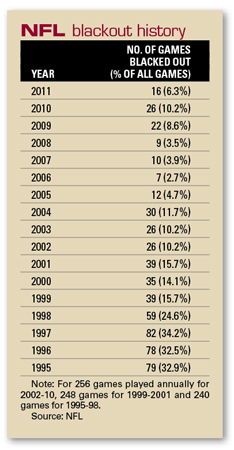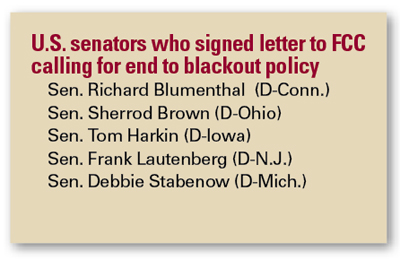One of the NFL’s top offseason priorities, boosting the in-stadium experience to attract fans to games, comes amid a renewed assault on the league’s controversial blackout rule.
The league believes the threat of blacking out games in home markets unless there is a sellout is necessary to get fans to fill stadiums — which in turn coveys the popularity of NFL games to the millions watching at home. But five U.S. senators, nine sports economists and a host of fans took shots at that argument last week in comments before the Federal Communications Commission, which is considering dropping the blackout restriction.
“I think it’s crazy,” said Lou Imbriano, a former New England Patriots chief marketing officer of the blackout rule. “You want your fans week in and week out seeing your team playing. The league is looking at it very myopically.”
The NFL has repeatedly backed the blackout rule, in place since 1973, and warned in its own filing to the FCC that its popularity could decline without the provision.
“The League’s blackout policy is designed to promote broad attendance and to make each game a special event,” the NFL wrote. “Anyone who has been at a basketball or football game in a half-filled arena versus one packed with tens of thousands of cheering fans will attest to the qualitative difference in the experience, regardless of the quality of play of the teams. In fact, the excitement that one feels in a packed arena or stadium translates onto television, and thus improves the television viewer’s experience.”
Part of the debate between the NFL and blackout opponents is a chicken-and-egg argument: Do mostly sold-out stadiums mean the blackout policy is working, or that it’s unnecessary?
“If televising games substantially reduced attendance, one would not expect that teams would televise all or nearly all of their home games,” the nine economists wrote in their filing with the FCC. “Extensive local telecasting of home games constitutes evidence that teams are benefited rather than harmed by live telecasts of home games.”
This past season, 16 games were blacked out, or about 6 percent of the league’s total games. That is on the low range of historical trends. When the FCC first imposed the blackout rule four decades ago, more than half of NFL games were blacked out.
Even if the FCC were to drop its blackout requirement, that does not guarantee blackouts would be eliminated. The NFL could still write blackout rules into TV contracts, but without the protection of a federal order, those policies could be subject to legal challenge.
“They certainly have the right to build it into their contracts, but the question is whether or not it constitutes an unreasonable restraint of trade,” said Andrew Zimbalist, one of the nine economists. “If someone challenged it legally, then the policy could fall. I think the issue here though is why the FCC should be protecting this policy.”
The FCC’s policy extends league policies on broadcast stations to channels that are carried by cable and satellite systems. The rules allow the NFL to apply its blackout policies for local television to channels available for carriage in the same market by cable and satellite systems.
The NFL has tried to tweak the policy at times, allowing clubs for example to place tarps on habitually unsold seats and not counting them toward attendance requirements.
The FCC solicited the comments at the request of the Sports Fan Coalition, a group that says its speaks for sports fans.
“Shouldn’t the teams have to lower prices if they’re not selling enough tickets?” said Brian Frederick, executive director of the coalition, in an interview. “Shouldn’t they actually have to sell the product on the field rather than the threat of blackouts? We encourage the NFL to do what all major U.S. airlines have done: When the airlines want to sell out a plane, they lower the ticket prices shortly before takeoff. If the league wants to sell out a stadium, it should lower ticket prices shortly before kickoff.”





